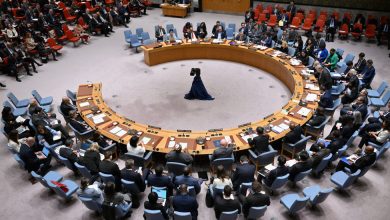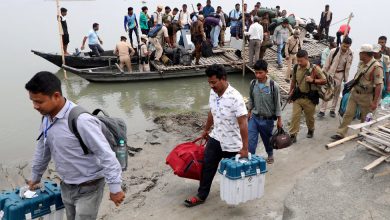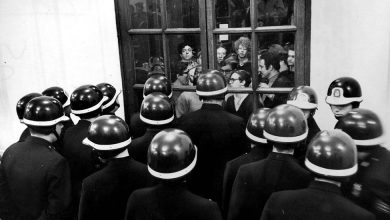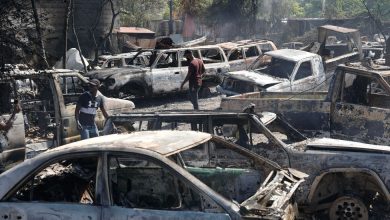As Russia Retreats, a Question Lingers: Who Counts as a Collaborator?

IZIUM, Ukraine — Russian officials came to Ina Mandryka with a simple proposition: If she agreed to open her school in a town in occupied territory, and teach in Russian, she would be promoted from deputy principal to principal.
For Ms. Mandryka, it was an easy choice. “I refused,” she said. “To teach the Russian curriculum is a crime.” The school, with its classrooms festooned in colorful pictures of giraffes and bears, remained closed.
Iryna Overedna, a second-grade teacher in the city of Izium, made a different choice. “The teacher in me thought, ‘The children should be in school,’” Ms. Overedna said. Besides, she said, she needed a salary to feed her family. She traveled to Kursk, in southwestern Russia, to study the new curriculum.
As Ukrainian troops forced the Russian Army into a chaotic retreat in Ukraine’s northeast this month, they reclaimed towns and villages that had been under occupation for more than five months. In doing so, they inherited a legal and ethical quandary that involves some thorny judgments: Who in the towns had collaborated with the Russians when they were in control?
In many places, the Russians had left tanks and their own war dead, but also evidence of potential war crimes with mass graves and torture rooms. For thousands of Ukrainians, occupation became a dark interlude of wartime collaboration, now punishable under Ukrainian law.
But the status of many activities is not necessarily clear-cut, because they are intertwined with everyday life. Ukrainian authorities, for instance, do not view doctors, firefighters and employees of utility companies as traitors because their jobs are considered essential to the functioning of a town. But police officers, municipal and regional government employees and some teachers who agreed to work under the Russian educational curriculum are classed as collaborators.
Teachers pose a special dilemma.

Iryna Overedna in her home in Izium on Saturday. “The teacher in me thought, ‘The children should be in school,’” she said.
Ukrainian officials have been unflinchingly critical of teachers willing to follow Russian guidance. In a war intended to quash Ukrainian identity and language, they say, agreeing to educate children according to a curriculum that denies the existence of Ukraine as a state is a grave crime.
There is a seething anger within the Ukrainian government at teachers who bent to the Russian authorities. Serhiy Horbachov, the education ombudsman, said teachers who collaborated should lose their credentials, at the least. “These people absolutely cannot be allowed to work with Ukrainian children,” he said in an interview. “It will be a very difficult and painful story.”
The State of the War
- Raising the Stakes: Kremlin-backed officials in four partially occupied regions announced referendums on joining Russia and President Vladimir V. Putin called up roughly 300,000 reservists to join the fight in Ukraine, indicating a possible escalation of the war.
- Ukraine’s Counteroffensive: As Ukrainian troops try to inch forward in the east and south without losing control of territory, they face Russian forces that have been bolstered by inmates-turned-fighters and Iranian drones.
- In Izium: Following Russia’s retreat, Ukrainian investigators have begun documenting the toll of Russian occupation on the northeastern city. They have already found several burial sites, including one that could hold the remains of more than 400 people.
- A Near Miss: A powerful Russian missile exploded less than 900 feet from the reactors of a Ukrainian nuclear plant far from the front lines, according to Ukrainian officials. The strike was a reminder that despite its recent retreat, Russia can still threaten Ukraine’s nuclear sites.
About 1,200 schools are still in occupied territory. In its counteroffensive, the Ukrainian army has captured an area that included roughly 65. About half had opened on Sept. 1 to teach the Russian curriculum, with a total of roughly 200 teachers, Ukrainian prosecutors say, only to close within days as the army swept in.
Not all will be arrested, Volodymyr Lymar, the deputy prosecutor of the Kharkiv region, said in an interview. The teachers will be assessed on how active a role they played in preparing or promoting Russian propaganda for children, he said, and punishment would be meted out accordingly. “For teachers it’s a difficult question,” he said.
Izium, a city of once elegant 19th-century brick buildings on bluffs overlooking the Siversky Donets River, is now largely in ruins. When Ukrainian soldiers recaptured it, residents greeted them with homemade dumplings and hugs. Even days later, many were so relieved at the end of occupation that they cried describing the city’s liberation.
But they bristled at how they are now being judged for the concessions they made to survive occupation — and for even small acts of cooperation with the Russian Army. It augurs a more widespread problem for Ukrainians as they liberate territory: the divisiveness and mistrust that arises from allegations of collaboration.
Already, some civilians in northern Ukraine have fled across the border to the Russian city of Belgorod, saying they are afraid of reprisals by Ukrainian authorities for working in jobs in city administrations. Others say that aggressive social media campaigns have made them targets for their fellow townspeople.
Within weeks of the Russian invasion in February, residents of Izium said, their sleepy provincial town had transformed into a through-the-looking-glass world of horrors: Bodies lay uncollected on the sidewalks, buildings were in ruins and Russian soldiers patrolled the streets. People huddled in basements for safety from shelling.
Soon, residents were forced into uncomfortable choices.
“Every person chose their fate,” said Oksana Hrizodub, a Russian literature instructor who refused to teach for the Russians but said she does not judge those who did. “For people who were stuck here it’s their personal affair,” she said.
Most teachers either fled the territory before occupation or refused to teach the Russian curriculum, staying home without a salary and surviving on preserved vegetables from their gardens or handouts from neighbors.
“They were putting pressure on some but not all of us” to teach, said Svitlana Sydorova, a biology, geography and chemistry teacher in the city of Balakliya who refused to go along with the Russian program. “Some agreed to collaborate of their own free will. The police should figure it out by looking into each case individually.”
Others hid to escape threats and pressure from the Russians. Iryna Shapovalova, an English teacher, said she mostly stayed at home through the occupation and avoided attention. “I was lucky,” she said. “I was hiding together with my children.”
Ms. Overedna, the second-grade teacher who agreed to return to work, described what she characterized as small steps toward cooperation with the Russians. The moral compromises were minor at first, she said.
First, she took part in June in a Russian-supported project to clean debris from a community center, called the House of Culture, so high-school students could use it for a graduation ball.
She and others received a “working ration,” a handout of food, in exchange — but said they did it not so much for the ration as to give the teenagers a tiny sense of normality and a celebration.
Later in the summer, she said, the Russian occupation authority contacted teachers who had tidied up the House of Culture to request they open schools in the fall. First, they would have to travel to Kursk to study the curriculum. She decided to go, and to resume teaching.
“What if the occupation lasted years?” Ms. Overedna said of her rationale. “Should the children not go to school?”
She said she didn’t see the Russian curriculum for second grade as particularly politicized. Yes, it was in Russian rather than Ukrainian and she was instructed to teach two Russian poets, Korney Chukovsky and Mikhail Prishvin. Otherwise, she said, “It was just a teachers’ conference,” like countless others she attended over the years.
“My goal was to survive,” she said. “To survive the winter, I would need to eat. To eat, I would need to work. To work, I had to go to the conference.”
It wasn’t only teachers who compromised in ways large and small with the Russian Army. Serhiy Saltivskyi received a “working ration” that included additional packages of spaghetti and cans of beef for moving bodies in his cargo van.
Initially, residents had buried those killed by shelling, or by gunshots by Russian soldiers, in shallow graves in yards and parks. But as warm weather set in, the Russians asked that bodies be moved to a pine forest on the edge of town, a site that now holds more than 400 graves and is being investigated for evidence of war crimes.
Mr. Saltivskyi defended his role in these reburials, saying he had done nothing wrong. “You cannot turn the town into a cemetery,” he said. “There were women and children, and it was hard, but who else would do it?”
The “working ration” helped him survive but came with a cost after liberation, in an indication of how the Russian retreat has left communities splintered over judgments about who collaborated and who didn’t.
“Now, people come to me on the street and point their finger and say, ‘He is the one!’” Mr. Saltivskyi said.
Yelena Yevmenova, the superintendent of an apartment block in Izium, handed over a list of all the building’s residents to the Russians in exchange for humanitarian aid. She said she had no regrets — people needed to survive, she said. “Let them now accuse us of eating Russian canned beef,” she said.
Ms. Overedna said she did not actually instruct Ukrainian children in the Russian curriculum; the Ukrainian offensive began before her school opened.
And she does not consider her willingness to teach a crime. “Teaching is my calling,” she said in an interview in her apartment, a darkened, cluttered space filled with boxes of canned goods. There is no electricity and to prepare meals she cooks on a campfire in the courtyard.
Through the hardships, she longed to return to the normality of the school year, she said. “I cannot imagine myself not in a classroom.”
Now, she said, “people are talking about who was a collaborationist, who worked for the enemy.”
She added, “And now everybody says, ‘You are an enemy of the people.’”
Evelina Riabenko contributed reporting.




